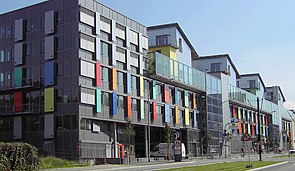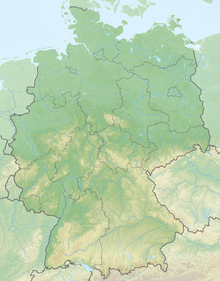Öko-Institut
| Öko-Institut eV Institute for Applied Ecology |
|
|---|---|
 Freiburg office of the Öko-Institut in the sun ship |
|
| Category: | private research institute |
| Carrier: | legally independent |
| Legal form of the carrier: | Registered association |
| Facility location: | Freiburg in Breisgau |
| Branch offices: | Darmstadt, Berlin |
| Type of research: | Applied research , policy advice |
| Subjects: | Natural sciences, engineering, social sciences |
| Areas of expertise: |
|
| Management: | Jan Peter Schemmel |
| Employee: | 174 (as of 2018) |
| Homepage: | www.oeko.de |
Locations of the Öko-Institut |
The Öko-Institut e. V. ( Institute for Applied Ecology ) is an independent, private environmental research institute with headquarters in Freiburg im Breisgau .
It emerged from the anti-nuclear movement in 1977 and today has more than 170 employees in Freiburg, Darmstadt and Berlin . The institute is organized as an association and pursues the goals of promoting environmental protection and sustainable development, which is to be achieved through scientific research, advice and education of the public, among other things. The sponsoring association has around 2,000 members, including almost 20 municipalities. It finances its work primarily through third-party funding for projects. There are also membership fees and donations . The turnover in 2018 was 17.8 million euros.
The facility is considered to be "one of the leading environmental research institutes in Germany".
Fields of activity
The Öko-Institut prepares scientific reports and advises politicians, environmental associations, institutions and companies. More than 370 national and international projects are developed every year. Subject areas are:
- Chemical management and technology assessment
- Energy and climate
- Radioactive waste and radiation protection
- Agriculture and Biodiversity
- Sustainable consumption
- Sustainable mobility
- Sustainable resource management
- Sustainable company
- Nuclear technology and plant safety
- Law , Politics and Governance
The institute is a founding member of the EnergieVision association , which awards the ok-power label for green electricity products. In addition, it launched the consumer information campaign EcoTopTen , which presents specific product recommendations for sustainable consumption on an internet portal. The Öko-Institut is also a member of the Ecological Research Network (Ecornet) , a network for sustainability research.
An important research contribution by the Öko-Institut was the development of product line analysis , which plays a very important role in ecology-oriented business research.
Publications
In 1978, the number 1 of the Öko-Mitteilungen appeared , which was initially only written with a typewriter and over the years developed into a richly illustrated members' magazine in booklet form with 32 pages. The magazine was published several times a year.
Since the summer of 2006, the Öko-Institut has also been offering its membership magazine with the new title eco @ work as a free e-paper . It is made available online as a PDF file on the homepage and can be subscribed to as an e-mail.
The institute's annual reports are published in German and English. Studies and research reports on various topics are also published.
Since May 2018, the employees of the Öko-Institut have been blogging about sustainability topics and current projects.
Institute management
Board
The board consists of a total of twelve people, seven of whom are external, who are elected for two years by the general assembly.
Managing directors
The management consists of Jan Peter Schemmel as spokesman as well as Anke Herold and Susanne Fröschl.
Board of Trustees
The executive committee selects a board of trustees from the sponsoring and honorary members of the association. The board of trustees meets at least once a year and works together with the board and management on the long-term tasks of the institute. The members of the board of trustees include Nina Buchmann , Martin Führ , Regine Kollek , Peter Cornelius Mayer-Tasch , Lucia Reisch and Udo E. Simonis .
criticism
The SPD energy expert Hermann Scheer accused the Öko-Institut in 2004 of working with the electricity companies in their fight against the Renewable Energy Sources Act (EEG). The institute rejected this criticism as unfounded and emphasized the importance of the EEG in promoting renewable energies. At the beginning of 2008, the RECS certificates issued by the Öko-Institut in Germany were criticized by the journalist Lars Lange as “fraudulent labeling”. The institute also rejected this criticism and at the same time emphasized the importance of green electricity seals of approval such as the ok-power label . The RECS system has now been transferred to the European Energy Certificate System (EECS), which also includes the guarantees of origin for electricity from renewable energies created under European law , in particular Directive 2009/28 / EC , and under the German EEG.
Web links
- www.oeko.de - Internet presence of the Öko-Institut
- www.ecotopten.de - EcoTopTen consumer information from the Öko-Institut
- “40 years of the Öko-Institut Freiburg: No trace of mid-life crisis” by Heike Holdinghausen: “The Öko-Institut provides facts and arguments to the environmental movement - and also takes on them. In the beginning it was all about building a nuclear power plant. ”In: Die Tageszeitung . (taz) of November 2, 2017
Individual evidence
- ↑ Legal notice of the official website . Retrieved March 27, 2020.
- ↑ a b Annual Report 2018 (PDF)
- ^ Öko-Institut eV . Goethe Institute . Retrieved January 11, 2017.
- ↑ Acting instead of hoping ( memento from September 15, 2012 in the web archive archive.today ), press release on the 30th anniversary of the Öko-Institut
- ↑ Ralf Tils, political advice in environmental policy , in: Svenja Falk, Dieter Rehfeld, Andrea Römmele, Martin Thunert (eds.): Handbuch Politikberatung . Wiesbaden 2006, 449-459, p. 453.
- ↑ Ecornet website ( Memento from May 29, 2013 in the Internet Archive )
- ↑ Roswitha Wöllenstein: Reception of environmental issues in business administration. An empirical reconstruction and structural theoretical analysis of ecology-oriented research in business administration . Munich 2008, p. 74.
- ↑ Öko-Mitteilungen, May 2006, page 22
- ↑ http://www.oeko.de/e-paper/
- ↑ https://www.oeko.de/publikationen
- ^ Articles and viewpoints from the Öko-Institut
- ↑ http://www.oeko.de/das-institut/leitung/vorstand/
- ^ Öko-Institut: Management , accessed on August 27, 2019
- ↑ http://www.oeko.de/das-institut/leitung/kuratorium/
- ↑ Commercial short circuit . taz.de. December 13, 2004. Retrieved May 8, 2011.
- ↑ The EEG is the right instrument (PDF; 131 kB) Öko-Institut e. V .. December 15, 2004. Retrieved May 8, 2011.
- ↑ Detlef Grumbach: Label fraud with green electricity? - The European green electricity certificate RECS under fire . dradio.de. February 8, 2008. Retrieved May 8, 2011.
- ↑ Ecological assessment of the use of green electricity certificates in the context of green electricity products (PDF; 226 kB) Öko-Institut e. V .. January 17, 2008. Retrieved May 8, 2011.
- ↑ Background paper on green electricity, Version 1.1 (PDF; 257 kB) from January 17, 2008
- ↑ Directive 2009/28 / EC of the European Parliament and of the Council , accessed on May 8, 2011 , cf. here Article 15; before 2009: Directive 2001/77 / EC of the European Parliament and of the Council , accessed on May 8, 2011 , cf. here article 5
